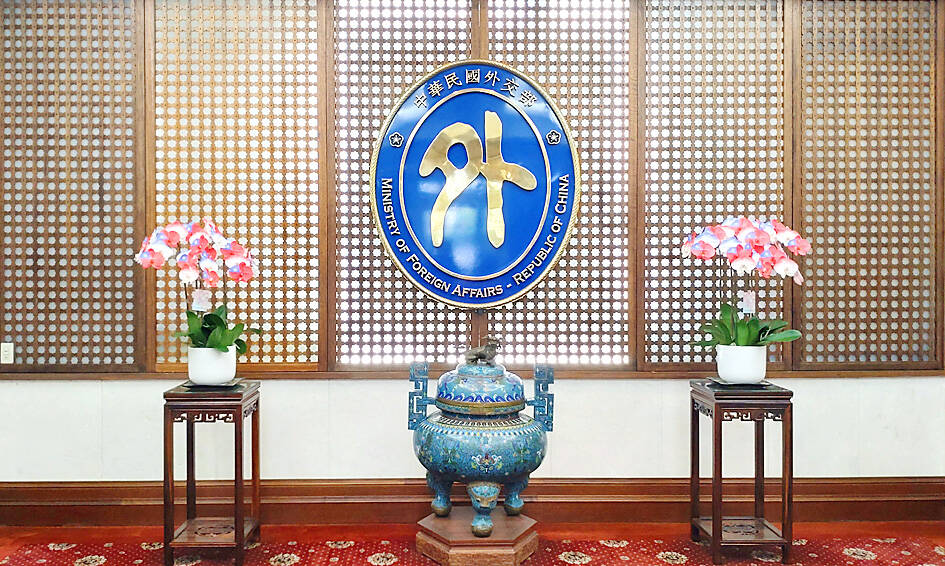Vice Minister of Foreign Affairs Alexander Yui (俞大?) last month visited Taiwan’s Latin American allies in a bid to cement relations amid rumors that some could sever diplomatic ties with Taipei, a source familiar with the issue said.
After the Chinese Communist Party’s 20th National Congress in October last year, Minister of Foreign Affairs Joseph Wu (吳釗燮) said there were “signs” and intelligence suggesting that a few allies might consider cutting ties with Taiwan.
Paraguayan opposition party presidential candidate Efrain Alegrehas has said that his country would cut diplomatic ties with Taiwan in favor of China if he wins an election scheduled for April.

Photo: Yang Cheng-yu, Taipei Times
Paraguayan President Mario Abdo Benitez in September last year asked Taipei to invest US$1 billion in the country to maintain diplomatic ties, as it would help him resist pressure from Beijing to switch diplomatic recognition.
Honduran President Xiomara Castro said she would consider severing ties with Taiwan during an election campaign in November 2021. Although Paraguay continued to maintain diplomatic ties with Taiwan after Castro was elected, Honduran Minister of Foreign Affairs Eduardo Enrique Reina said “we are maintaining a fluid relationship.”
Reina on Jan. 1 met with Chinese Vice Minister of Foreign Affairs Xie Feng (謝鋒) to discuss trade issues, and former Honduran president Jose Manuel Zelaya — Castro’s husband — advocated for ties with Beijing.
The Community of Latin American and Caribbean States summit is to be held in Argentina on Tuesday next week. US and Chinese leaders have also been invited.
Some political watchers have said that if Chinese President Xi Jinping (習近平) attends the summit, he might interact with Castro, who has confirmed her attendance.
Due to China’s attempts to convince Taiwan’s allies to switch official recognition to Beijing, Taipei has 14 diplomatic allies: the Marshall Islands, Nauru, Palau and Tuvalu in the Pacific; Eswatini in Africa; the Holy See in Europe; Belize, Guatemala, Haiti, Honduras and Paraguay in Latin America, and Saint Kitts and Nevis, Saint Lucia, and Saint Vincent and the Grenadines in the Caribbean.
Four of the eight countries that severed ties with Taiwan since President Tsai Ing-wen (蔡英文) took office in 2016 are Latin American countries: Panama, the Dominican Republic, El Salvador and Nicaragua.
Taipei’s relations with many of the region’s allies remain healthy, political watchers have said, and leaders from allies in Central America and the Caribbean visited Taiwan last year.
Saint Vincent and the Grenadines Prime Minister Ralph Gonsalves was the first head of state to visit Taipei to show his support after China conducted military drills around Taiwan in August last year.
Belizean Prime Minister John Briceno has had frequent interactions with high-level officials in Taiwan, and led a delegation to Taiwan in March last year.
Guatemalan President Alejandro Giammattei has openly supported Taiwan many times and has invited Tsai to cohost a planned summit of states that maintain diplomatic relations with Taipei.
Haiti continues to engage in bilateral cooperation projects with Taiwan and has spoken out for the country at the UN.

The brilliant blue waters, thick foliage and bucolic atmosphere on this seemingly idyllic archipelago deep in the Pacific Ocean belie the key role it now plays in a titanic geopolitical struggle. Palau is again on the front line as China, and the US and its allies prepare their forces in an intensifying contest for control over the Asia-Pacific region. The democratic nation of just 17,000 people hosts US-controlled airstrips and soon-to-be-completed radar installations that the US military describes as “critical” to monitoring vast swathes of water and airspace. It is also a key piece of the second island chain, a string of

A magnitude 5.9 earthquake that struck about 33km off the coast of Hualien City was the "main shock" in a series of quakes in the area, with aftershocks expected over the next three days, the Central Weather Administration (CWA) said yesterday. Prior to the magnitude 5.9 quake shaking most of Taiwan at 6:53pm yesterday, six other earthquakes stronger than a magnitude of 4, starting with a magnitude 5.5 quake at 6:09pm, occurred in the area. CWA Seismological Center Director Wu Chien-fu (吳健富) confirmed that the quakes were all part of the same series and that the magnitude 5.5 temblor was

Taiwan will now have four additional national holidays after the Legislative Yuan passed an amendment today, which also made Labor Day a national holiday for all sectors. The Chinese Nationalist Party (KMT) and Taiwan People’s Party (TPP) used their majority in the Legislative Yuan to pass the amendment to the Act on Implementing Memorial Days and State Holidays (紀念日及節日實施辦法), which the parties jointly proposed, in its third and final reading today. The legislature passed the bill to amend the act, which is currently enforced administratively, raising it to the legal level. The new legislation recognizes Confucius’ birthday on Sept. 28, the

The Central Weather Administration has issued a heat alert for southeastern Taiwan, warning of temperatures as high as 36°C today, while alerting some coastal areas of strong winds later in the day. Kaohsiung’s Neimen District (內門) and Pingtung County’s Neipu Township (內埔) are under an orange heat alert, which warns of temperatures as high as 36°C for three consecutive days, the CWA said, citing southwest winds. The heat would also extend to Tainan’s Nansi (楠西) and Yujing (玉井) districts, as well as Pingtung’s Gaoshu (高樹), Yanpu (鹽埔) and Majia (瑪家) townships, it said, forecasting highs of up to 36°C in those areas